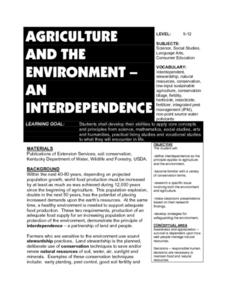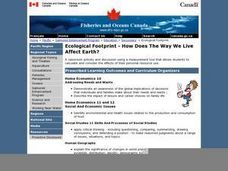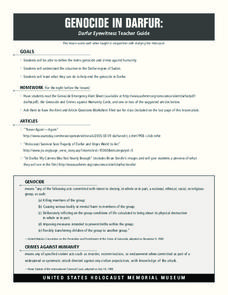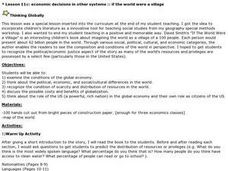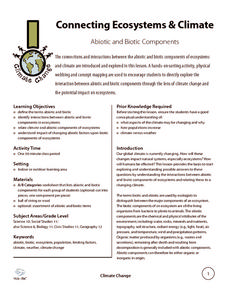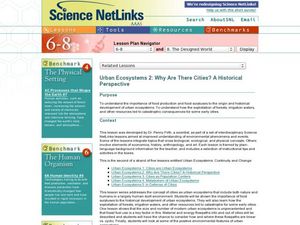Curated OER
Digital Video Lesson Plan: Brine Shrimp
Students participate in classroom experiment to gain better understanding of type of environment brine shrimp can best survive. Students then explore effects of common saltwater pollutants on survival of animals in sea.
NOAA
Vertebrates I
I spy a spine. The 19th installment of a 23-part NOAA Enrichment in Marine sciences and Oceanography (NEMO) program explores vertebrate species, such as sharks and other fish. Learners take part in an activity evaluating the...
Kenan Fellows
Assembly Required and the Design Process Too!
Do your part to make manufacturing more manageable. A capstone project challenges each group to identify and research a manufacturing process for a product. To complete the activity, they create a presentation for business and community...
Wild BC
Bearly Any Ice
After reviewing food chains, your class members participate in an arctic predator-prey game that exemplifies the impact of climate change of food availability. If you are in a hurry, skip this lesson, but if you have the time to...
Curated OER
Oh, What A Day
Students listen as the teacher reads A Country Far Away. They predict what they will do and what they think their partner student will be doing. Students create a KWL chart for Japan. They collect information about their activities on an...
Curated OER
Agriculture and the Environment
Young scholars investigate the interdependence of agriculture and the environment. They research areas of interdependence and provide examples of situations where farmers are practicing conservation in the local area. Their findings are...
Curated OER
Ecological Footprint--How Does The Way We Live Affect Earth?
Students demonstrate an awareness of the global implications of decisions that individuals and families make about their needs and wants. They identify environmental and health issues related to the production and consumption of food....
University of Kentucky
Beneficial Bug Scavenger Hunt
Many people think of bugs as annoying pests to be squashed, but most insects and spiders are beneficial, eating the actual pests or pollinating plants. After reviewing some of the common bugs in your area (they may differ from those...
Ventura County Air Pollution Control District
Effects of Global Warming
Your learners have probably heard of climate change, but do they really understand what it is? Study the history, details, and future implications of global warming and the greenhouse effect with a set of activities designed for an...
NOAA
Ocean Exploration
Sea explorers and scientists have found that because of temperatures being two to three degrees Celsius at the bottom of the ocean, most animals are lethargic in order to conserve energy. In this web quest, pairs of learners read about...
Curated OER
Transportation and Environment
Students make an eco-friendly vehicle to help make transportation better for the environment. In this transportation lesson, students learn how transportation inventions are bad for the environment. They then see how engineers have tried...
Curated OER
The Black Death: 1347 - 1351
Grim and gruesome, the Black Death literally infects history with its social and political ramification. Your class will be positively agog over the details of the Plague, from its causes to its symptoms, and eventually to its grisly end...
Curated OER
Morality "Tails" East and West: European Fables and Buddhist Jataka Tales
Have your class explore Buddhist Jataka Tales to compare and contrast them to European fables. After defining fables, Jataka tales, and the elements of each, learners identify themes and patterns for both types of narratives and the...
Curated OER
Hazards: Fifth Grade Lesson Plans and Activities
After comparing earthquake and volcanic hazards to one another, fifth graders take a closer look at damage associated with a volcanic eruption. They then create a simulation of mudslides due to a volcanic eruption. Using different...
Chicago Botanic Garden
Unit 4 Pre-Assessment
Pre-assessments are great to help teachers determine what information their classes lack, what misconceptions they have, and how in depth to teach specific concepts. The first in a five-part series is a pre-assessment of middle...
US Holocaust Museum
Genocide in Darfur: Darfur Eyewitness Teacher Guide
The events of the Holocaust in World War II would never happen again, right? Scholars research the current genocide taking place in Darfur. Using video and Holocaust Reading Passages, they analyze the horror of this forgotten part of the...
Curated OER
If the World Were a Village...
Your class members explore concept that the world is a large place, examine how statistics can be used to help in understanding the world and its people, and create illustrations or graphs of statistics found in the award-winning...
Wild BC
Connecting Ecosystems & Climate
Collaborators sort a set of cards into biotic and abiotic categories. Then, as a class, they discuss their work and relate each of the abiotic components to climate change. Finally, they form a web of components by connecting those that...
Virginia Department of Education
Changes in Ecosystems
How does water pollution affect the environment? Provide your class with the resources to answer this question as they learn about eutrophication and ecosystem changes. Over two weeks, they simulate the effects of pollution on the...
EngageNY
Operations with Numbers in Scientific Notation
Demonstrate the use of scientific notation within word problems. The lesson presents problems with large numbers best represented with scientific notation. Pupils use these numbers to solve the problems in the 11th installment in a...
ProCon
Right to Health Care
Is health care a right or a privilege? Scholars review pro and con arguments to decide if all Americans should have the right to health care. They also watch informative videos and review information on the United States and...
California Polytechnic State University
Australian Geography Unit
At the heart of this resource is a beautifully detailed PowerPoint presentation (provided in PDF form) on the overall physical geography of Australia, basic facts about the country, Aboriginal history, and Australia culture and lifestyle.
Curated OER
Urban Ecosystems 4: Metabolism of Urban Ecosystems
Middle schoolers discover that material and energy uses by a city come from outside the city boundaries. They realize that the pathway of these material is linear instead of cyclical as they are in natural ecosystems.
Curated OER
Urban Ecosystems 2: Why Are There Cities? A Historical Perspective
Students investigate the importance of food surpluses to the historical development of urban ecosystems.
Other popular searches
- Human Population Growth
- Human Population Ecology
- Human Population Graphs
- Human Population Density
- Human Population Studies
- Human Population India
- Human Population Crisis
- Human Population Dynamics
- Human Population u.s.
- Human Population Us
- Worldwide Human Populations
- Human Populations Growth





